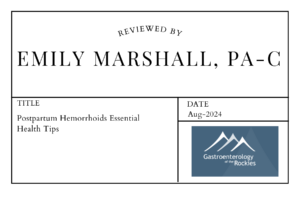
Postpartum Hemorrhoids Essential Health Tips

Childbirth brings us so many unexpected and beautiful changes in our lives. The joy and anticipation of this new beginning is something to savor. Yet, during all this excitement, embracing motherhood also means new moms will undoubtedly encounter unexpected challenges. This includes making time for your own needs—like managing postpartum hemorrhoids with these essential health tips.
Hemorrhoids can be uncomfortable and stressful for new mothers, who are already juggling baby care with their own needs. At GI of the Rockies, our team of female GI specialists are here to answer your questions.
We’ve dedicated this blog post to discuss hemorrhoid treatments for postpartum women. We’re sharing helpful health tips and highlighting the benefits of consulting with a female gastroenterologist or physician assistant to discuss treatment options with you.
Understanding Postpartum Hemorrhoids

During pregnancy and postpartum recovery, some women are prone to hemorrhoids. Hemorrhoids, sometimes called piles, are swollen veins in the rectum or anus. Postpartum hemorrhoids can be internal, inside the rectum—or external, around the anus. Here are some factors that contribute to postpartum hemorrhoids.
- Increased Pressure: The growing uterus adds pressure to pelvic veins. This may lead to swollen hemorrhoids.
- Hormonal Changes: These changes in hormone levels can affect the elasticity of veins and increase swelling.
- Straining During Labor: Pushing during childbirth can lead to the development of hemorrhoids or worsen them.
- Constipation: A common side effect for pregnant women is constipation and noticeable straining during bowel movements. Long term constipation can worsen hemorrhoid symptoms, like swelling, itching and irritation.
Effective Hemorrhoid Treatments for Postpartum Women
Want to better manage postpartum hemorrhoids? At GI of the Rockies, we like to think about an approach that combines lifestyle adjustments like nutrition, at-home remedies, and possibly, medical treatment.

Managing Hemorrhoids Symptoms
Here are some effective ways to alleviate hemorrhoid symptoms and promote healing in postpartum women.
- Dietary Adjustments
- Eat More Fiber: A fiber rich diet may help reduce straining during bowel movements because fiber adds bulk and helps prevent constipation. Postpartum women can ease symptoms by reaching for foods like apples, cauliflower, sauerkraut, whole grains like oatmeal or quinoa, and plant-based proteins like red beans and lentils.
- Get Hydrated: Drinking adequate amounts of water helps prevent constipation and softens stool for easier bowel movements.
- Avoid Spicy Foods: Spicy foods may worsen hemorrhoid symptoms.
Did you know? One cup of cooked quinoa delivers 5 grams of fiber.
[Harvard School of Public Health]
- Over-the-Counter Treatments
- Topical Creams and Ointments: Ingredients like hydrocortisone or witch hazel can help reduce inflammation and itching. Follow the directions on packaging and talk to your GI specialist or primary doctor before using medication.
- Suppositories: Used internally, these medicines provide relief by reducing swelling when applied directly to the hemorrhoids.
- Home Remedies
- Warm Sitz Baths: Soaking your bottom in a warm sitz bath for 10-15 minutes several times a day feels soothing and helps reduce inflammation.
- Cold Compresses: Applying a cold pack to the area can help alleviate swelling and provide temporary relief.
- Proper Hygiene: Keep the area clean by using a gentle soap or unscented wipes after bowel movements. Then gently pat the area dry. If you prefer using baby powder for added dryness, use unscented that contains cornstarch. [University of Utah]
TIP: Avoid flushing wipes in the toilet to prevent plumbing issues. Many flushable wipes on the market may not be flushable, despite the packaging description.
- Lifestyle Modifications
- Exercise Regularly: If your OB-Gyn doctor clears you for gentle exercise, consider walking. This helps with circulation and regular bowel movements. Avoid heavy lifting. Strenuous activities can worsen your symptoms.
- Avoid Prolonged Sitting: Sitting in your chair or on the couch for too long increases pressure on hemorrhoids. Set a timer to remind yourself it’s time to get up and move around.
- Medical Treatments
What if treating hemorrhoids at home doesn’t work? For persistent hemorrhoid symptoms that won’t clear up, medical interventions may be necessary.
- Hemorrhoid Banding: This treatment is also called rubber band ligation. A small band is placed around the base of the hemorrhoid to cut its blood supply. Eventually the hemorrhoid usually shrinks or falls away. Gastroenterologists are trained to provide hemorrhoid banding as a quick in-office treatment.
- Sclerotherapy: Injected into the hemorrhoid, this chemical solution shrinks the hemorrhoid.
- Surgical Options: When surgery is required, we can refer patients to a surgeon.
Did you know—many insurance carriers cover hemorrhoid banding treatments.
The Importance of Talking with a Female Gastroenterologist or GI Specialist

While home remedies and over-the-counter treatments can help you manage mild to moderate hemorrhoids, talking with your female gastroenterologist or GI specialist can help you get better results. Here are a few reasons why.
- Accurate Diagnosis
A gastroenterologist can provide an accurate diagnosis. Did you know hemorrhoids are sometimes confused with other more serious conditions? Gastroenterologists are adept at ruling out conditions like anal fissures, or tears in the anus, abscesses and colorectal cancer. A thorough examination is key. Why? Because it helps you receive an accurate diagnosis which guides the best treatment plan so you can start to heal. If you experience rectal bleeding, let your gastroenterologist know.
Rectal bleeding can also be a sign of inflammatory bowel disease. This is why it’s important to talk to your doctor when you see blood. [Source: Cleveland Clinic]
- Customized Treatment Plan
A gastroenterologist or GI specialist develops a treatment plan based on your specific needs and lifestyle. They can offer advanced treatment options which go beyond over-the-counter treatments. This includes minimally invasive procedures, like hemorrhoid banding or prescription medicine. A customized treatment plan offers a personalized approach that tackles the root cause of your symptoms so you can heal.
- Expert Guidance on Postpartum Care
Getting through your postpartum recovery can be challenging. That’s why working with a female gastroenterologist or GI specialist who understands you can be a great choice. Working with a female physician or physician assistant can provide you with expert advice on managing postpartum hemorrhoids. Additionally, it’s important to consider your overall health and recovery as a new mom. These highly trained specialists offer guidance on diet, lifestyle changes, and safe practices that help you avoid aggravating symptoms.
- Monitoring and Follow-Up
The standard of care is monitoring hemorrhoids to ensure they are healing. A gastroenterologist can track your progress, adjust treatments and provide support during your recovery process.
Anyone who has experienced postpartum hemorrhoids knows about the discomfort and distraction it can cause new mothers. However, taking time to get diagnosed and treated means you will have a better way to effectively monitor and manage symptoms so that you get the care you deserve. Dietary adjustments, home remedies and lifestyle changes help alleviate discomfort. For persistent or severe postpartum hemorrhoids, consulting a gastroenterologist or physician assistant is essential in getting an accurate diagnosis, customized treatment and expert guidance.
Improving the Postpartum Experience
Remember, when postpartum hemorrhoids won’t resolve on their own, talking to a female GI specialist can significantly improve your postpartum experience. With proper care and treatment, you can focus on what really matters—enjoying motherhood and your precious newborn.

Overall, if you’re struggling with postpartum hemorrhoids or have concerns about your symptoms, contact your female gastroenterologist for the personalized care. Your health and comfort is paramount during this special time as a new mom. Expert guidance can make all the difference while your body heals after childbirth.
Learn more about hemorrhoid banding treatments with our trusted group of female physicians and physician assistants who specialize in gut health and the GI tract.
The Hemorrhoid Center of Colorado is part of Gastroenterology of the Rockies—with the same doctors, physician assistants and registered nurses you already know and trust.
Request a female GI specialist today and discuss hemorrhoid treatments. Call today at 303-604-5000.
Medical review provided by Emily Marshall, PA-C with GI of the Rockies

